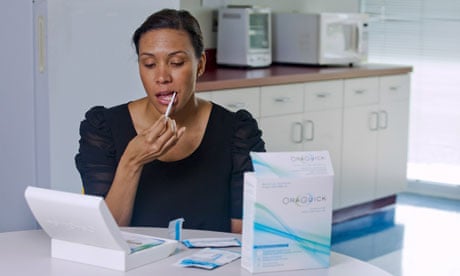The news that the American Food and Drug Administration (FDA) has approved the use of a home testing kit for HIV was accompanied by hopeful words about how it could reduce the stigma surrounding the infection and "normalise" being HIV positive. Some physicians, charities and HIV specialised service providers have argued that this is an innovative trend in the early diagnosis of the disease that will lead to better treatment and care. But many of us who have worked in the HIV sector for many years are far from convinced.
While early diagnosis followed by treatment and care is a major force in driving down the epidemic the world over, it doesn't mean that this innovation will make HIV testing normal.
There is a risk that we are falling for propaganda designed to do more to help Orasure Technologies, which developed the OraQuick test for HIV, and less to help those confronted with the prejudice associated with a positive diagnosis.
Many people in the UK remember the terrifying government adverts in the early 80s with tombstones and the message "Don't Die of Ignorance". Everybody now agrees that, however well-intentioned they were, they equated Aids with death and massively increased the stigma attached to the infection.
Thirty years on and that stigma still exists. Online surveys that I have taken part in show that even among gay men the level of prejudice is alarmingly high. After a three-week experiment we discovered that 90% of messages posted using profiles of men declaring themselves to be HIV positive were met either with no response at all or with a reply saying basically, "no thanks if you have HIV". The same messages, with the same profiles but with a negative HIV status produced a completely different and welcoming response.
It should come as no surprise that people are reluctant to find out their status. They are too scared to cross that river.
I have worked in the HIV sector for over a decade and have provided support for newly diagnosed people. There is nothing more emotional than discovering you are HIV positive. I have counselled and supported people who saw their HIV diagnosis as a death certificate.
Before I came to London, I was a young HIV activist growing up in Nigeria in the late 90s. There the ethics of HIV testing was built around what we called volunteer testing and counselling. Pre- and post-HIV counselling was mandatory for everyone taking the test. This was not because we wanted to create employment for counsellors. We knew that with all the stigma and discrimination came the need to support newly diagnosed people.
If HIV infection really had been normalised in that time then there might be a stronger case for these kits. But it hasn't. I have never seen anyone in my 10 years of HIV advocacy who has ever been prepared for the result of their HIV test. Newly diagnosed people need support. Although the self-diagnosis kit offers a helpline, there's no guarantee of its quality and it's a very different proposition to face-to-face counselling. They shouldn't be left at home with no one to talk to.
Some people might argue that I am too conservative with my approach to HIV testing. But in reality, support at the point of diagnosis has helped many people to initiate treatment in the first place and then hopefully to have a positive outlook to life even with an HIV positive status.
Unlike the FDA and other regulatory bodies in the world, I deal with human beings and not data. I deal with the everyday story of ordinary people. And it is their reality that tells me that HIV cannot be normalised and that home test kit are not the answer to the problem of late diagnosis.
